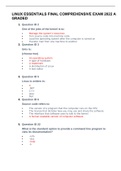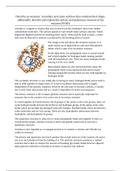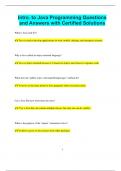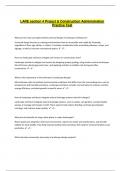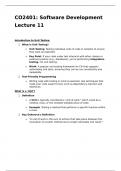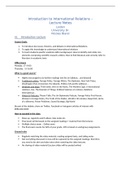VRIJE UNIVERSITEIT - BACHELOR PSYCHOLOGY
WEEK 1
● LECTURE 1: Introduction
● LECTURE 2: Schema Therapy (Part 1: Background and Theory)
○ ARTICLES:
■ Schema Therapy - Arntz (2018)
■ Towards a Reformulated Theory Underlying Schema Therapy: Position Paper of an International
Workgroup - Arntz (2021)
WEEK 2:
● LECTURE 3: Inference Based Approach for OCD
● LECTURE 4: Schema Therapy (Part 2: Application)
○ ARTICLES:
■ The Inference-Based Approach to Obsessive Compulsive Disorder: A Comprehensive Review of it’s
Etiological Model, Treatment Efficacy and Model of Change - Julien, O’Conner (2016)
■ Causal Role for Inverse Reasoning on Obsessive-Compulsive symptoms: Preliminary evidence from a
Cognitive Bias Modification for Interpretation Bias Study - Wong, Grisham (2017)
■ Treatment for Chronic Depression using Schema Therapy - Renner (2013)
■ The Effectiveness of Schema Therapy for paitnets with Anxiety Disorders, OCD, or PTSD: A
Systematic Review and Research Agenda - Peeters (2022)
WEEK 3:
● LECTURE 5: Dialectical Behavioral Therapy
○ ARTICLES:
■ Emotion Regulation in Schema Therapy and Dialectical Behavior Therapy - Fassbinder (2016)
■ The Effect of Therapist Use of Validation Strategies on Change in Client Emotion in Individual DBT
Treamtnet sessions - Carson-Wong (2018)
■ Dialectical Behavior Therapy for High Suicide Risk in Individuals with Borderline Personality Disorder
- Linehan (2015)
WEEK 4:
● LECTURE 6: Treatment for Eating Disorders
● LECTURE 7: Treatment for Forensic Youth Psychopathology
○ ARTICLES:
■ Comparing the Effectiveness and Predictors of CBT Enhanced between patients with various eating
disorers diagnoses - Melisse (2022)
, ■ Inpatient Cognitive Behavior Therapy for Anorexia Nervosa: A Randomized Controlled Trial - Dalle
(2013)
■ Common Elements of Evidence-based Systemic Treatments for Adolescents with Disruptive
Behavior Problems - Van Der Pol (2019)
■ Origins of Violent Behavior over the lieft span - Farrington (2018)
WEEK 5:
● LECTURE 8: Transference Focused Psychotherapy
● LECTURE 9: Psychoanalytic Group Therapy
○ ARTICLES:
■ Changes in Attachment Representation and Personality Organization in TFP - Diamond (2023)
■ Transference Focused Psychotherapy for patient with personality disorders: Overview and case
example with a focus on the use of contracting - Radcliffe & Yeomans (2019)
■ Chapter 1: The Therapeutic Factors - Yalom & Leszcz (2005)
■ Chapter 2: Interpersonal Learning - Yalom & Leszcz (2005)
■ Chapter 3: Group Cohesiveness - Yalom & Leszcz (2005)
WEEK 6:
● LECTURE 10: Treatment for Complex Trauma
● LECTURE 11: Trauma Treatment for Psychosis
○ ARTICLES:
■ Phase-based treatment vs Immediate Trauma-Focused Treatment in paitnet with childhood
trauma-related PTSD - Van Vliet et al (2018)
■ Chapter 10 of the book “A clinical introduction to psychosis: Foundations for clinical and
neuropsychologists” Edited by J.C. Badcock and G. Paulik-white, explore the relationship between
trauma, post-traumatic stress (PTS) and psychosis
■ ISTSS Guidelines Position Paper on Complex PTSD in Adults
■ Chapter 19: Trauma Therapies in Psychosis - Van de Berg (2020)
WEEK 7:
● LECTURE 12: Suicide Prevention Strategies
○ ARTICLES:
■ Improving Suicide Prevention through Evidence-based strategies - Mann et al (2021)
■ The Psychology of Suicidal Behavior - O’Connor (2014)
,.. LECTURE 1. INTRODUCTION WEEK 1
COMPLEX PSYCHOLOGICAL PROBLEMS
● Subjective => for patient and therapist.
● Comborbidity is very common,and can affect many different areas of one’s life
○ Severe problems in daily life, many different treatments, long treatments
● But, most complex psychological problems are
o Impactful and highly distressing
o Severe (harder to treat with the first step treatment, low intensity)
o Long-lasting or recurrent => often early development and continue in adulthood.
o High comorbidity and additional problems.
Common mental health disorders Complex mental health disorders
● MDD ● Personality disorder
● Anxiety Disorders ● Eating disorders
● Specific phobias ● Chronic/persistent depression
● Sleep disorders ● OCD
● ADHD ● Psychosis
=> Usually occurs once and does not really reoccur again ● (Complex) PTSD
=> First time diagnosis ● Dissociative Identity Disorder
● BIpolar Disorder
PSYCHOLOGICAL INTERVENTIONS FOR COMPLEX PROBLEMS
● Originate from previously existing therapies:
o Psychoanalytic psychotherapy (Sigmund Freud)
o Cognitive Behavior Therapy (Anton Beck)
- Precursor of treatment that we are discussing (not the only one).
PSYCHOANALYTIC PSYCHOTHERAPY - RECAP
● Developed in the late 19th century/early 20th century
● Goal: bring unconscious or deeply buried thoughts and feelings to the conscious mind
● Become aware of hidden meanings or patterns
● Examine how repressed experiences and emotions (often from childhood) may contribute to current experiences,
actions and problems
● Historically: traditionally 4-5 sessions per week, 4 years at the time (long treatment)
● Psychoanalytic techniques:
a) Dream analysis => get insight of working the unconscious mind.
b) Free association => start talking about thoughts and hope for the emergence of emotions ot thoughts that
you weren't aware of.
, c) Transference => patient project their feeling onto the therapist. Project the feeling of for instance his/her
mum to the therapist. The therapist uses this in treatment.
d) Countertransference => is the opposite=> when the practitioner project feeling of someone else to the client.
COGNITIVE BEHAVIOR THERAPY - RECAP
● Developed in the 1960s as cognitive therapy for depression
(originally)
o Unvalidated thoughts and cognitive disruptions
o Impact on emotions and behaviors
o Often not needed to dive into the past (stay in the present)
● Extensively researched and found effective for many
psychiatric disorders, such as anxiety, OCD, PTSD, eating
disorders, psychosis etc.
Cognitive model
● Dysfunctional automatic thoughts =A often developed through early experience.
● Cognitive distortions => Errors in logical reasoning, e.g. dichotomous thinking ‘’black or white’’.
● Core belief => develop early on in life, also called schemas about the self, others, and world.
Goal
● Changing cognitions and behavior to bring about change in how one feels in daily life
Means
● Structured, goal-oriented treatment sessions
● Aim: patient responsible own therapeutic process.
● Practical and active participation (we need active engagement)
Techniques
● Cognitive restructuring: replacing negative automatic thoughts
● Exposure therapy
● Behavioral experiments: testing your expectations
● Behavioral activation
● Problem-solving skills
● Relaxation
Treatments for complex psychological problems – discussed in course
Psychoanalysis:
- Not as strict and intense as traditionally
- E.g.: TFP => is quite structure
- PA groups, long (almost 2 years), free association
CBT
● IBA
● DBT => Dialectical Behavioral Therapy


